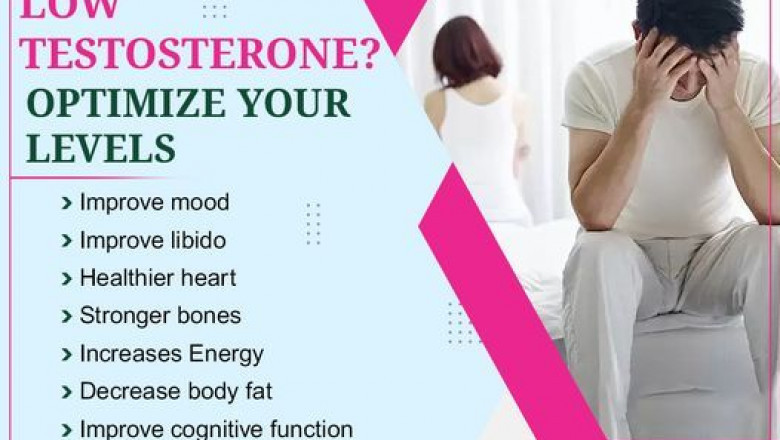views
As men age, it’s natural for testosterone levels to gradually decrease. However, in some cases, testosterone levels fall below the normal range, leading to a condition known as low testosterone or Low T. Low testosterone can significantly impact a man's quality of life, affecting physical health, mental well-being, and sexual function. At Hormone Hub, we specialize in diagnosing and treating low testosterone with customized testosterone therapy to help men restore their vitality.
But how do you know if you might need testosterone therapy? Here are the top signs that could indicate low testosterone levels:
1. Chronic Fatigue and Low Energy
If you’re feeling tired all the time, even after a good night's sleep, it could be a sign of low testosterone. Men with low T often experience extreme fatigue that makes it difficult to maintain an active lifestyle. If you’re constantly feeling drained, testosterone therapy can help restore energy levels and improve your overall stamina.
2. Reduced Sex Drive
One of the hallmark symptoms of low testosterone is a noticeable drop in libido. While it’s normal for sexual desire to decrease with age, a sudden or significant loss of interest in sexual activity can be a sign of low T. Testosterone therapy can help revitalize your sex drive and improve your overall sexual health.
3. Erectile Dysfunction
Testosterone plays a crucial role in achieving and maintaining an erection. If you’re struggling with erectile dysfunction (ED) or finding it difficult to get an erection, low testosterone could be a contributing factor. Testosterone therapy may help improve erectile function by addressing the hormonal imbalance that affects sexual performance.
4. Decreased Muscle Mass
Testosterone is essential for building and maintaining muscle mass. If you’re noticing a loss of muscle strength or difficulty gaining muscle, even with regular exercise, low testosterone could be the reason. Testosterone therapy can help restore muscle mass and improve physical strength.
5. Increased Body Fat
Men with low testosterone often experience an increase in body fat, especially around the midsection. Testosterone helps regulate fat distribution, and without adequate levels, fat tends to accumulate more easily. Testosterone therapy can help reduce body fat and improve muscle tone.
6. Mood Changes and Irritability
Testosterone isn’t just important for physical health—it also affects your mood. Men with low testosterone may experience irritability, anxiety, and even depression. If you’re feeling unusually emotional, moody, or anxious, it could be related to a hormonal imbalance. Testosterone therapy may improve your mood and mental well-being by balancing your hormones.
7. Memory and Cognitive Decline
Testosterone plays a role in cognitive function, and low levels can lead to memory problems, difficulty concentrating, and mental fog. If you’ve noticed that your memory or focus isn’t as sharp as it used to be, testosterone therapy may help enhance your cognitive abilities.
8. Hair Loss
Testosterone affects hair growth, particularly on the face and body. If you’ve noticed a sudden reduction in body or facial hair, or are experiencing male pattern baldness, low testosterone could be the cause. Testosterone therapy may help slow down or reverse hair loss in some cases.
9. Low Bone Density
Testosterone helps maintain bone density, and a drop in testosterone levels can lead to weaker bones, making you more susceptible to fractures and osteoporosis. If you’ve experienced unexplained bone issues, low testosterone might be to blame. Testosterone therapy can help strengthen bones and reduce the risk of fractures.
10. Difficulty Sleeping
Men with low testosterone often report sleep disturbances, including insomnia or trouble staying asleep. Testosterone therapy may help improve sleep quality by restoring hormonal balance.
When Should You Consider Testosterone Therapy?
If you’re experiencing any of the signs above, it’s important to consult a healthcare provider for an evaluation. At Hormone Hub, our experienced team offers comprehensive hormone testing and personalized treatment plans to help you regain your health and vitality. Testosterone therapy is a safe and effective way to manage symptoms of low testosterone and improve your overall quality of life.
Why Choose Hormone Hub?
At Hormone Hub, we specialize in testosterone therapy in Pune and men’s health. Our clinic is dedicated to helping men navigate the challenges of low testosterone with customized, evidence-based treatments. With our personalized approach, you’ll receive the care and attention you need to feel like yourself again. Experience the benefits of expert testosterone therapy and regain your vitality today!
Don’t let low testosterone affect your quality of life. Contact Hormone Hub today to schedule a consultation and start your journey to better health!
By addressing low testosterone early, you can prevent long-term health issues and enjoy a more fulfilling, energized life. Take charge of your health with the experts at Hormone Hub!






















Comments
0 comment